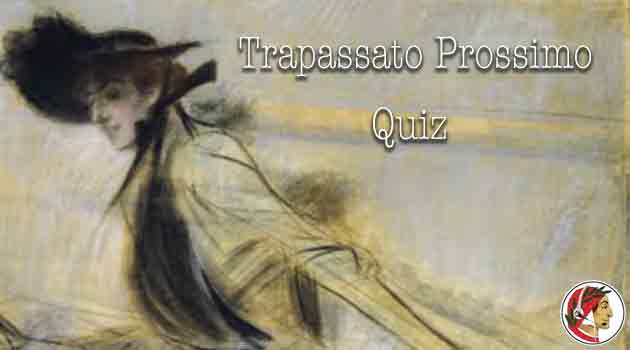Cosa impareremo oggi
👆🏻 link ai paragrafi
- Formazione del Trapassato Prossimo
Formation of the Trapassato Prossimo - Formazione dei Verbi Ausiliari
Formation of Auxiliary Verbs - Usi del Trapassato Prossimo
Uses of the Trapassato Prossimo - Sequenza Temporale
Temporal Sequence - Eventi Sottintesi
Implied Events - Passato Lontano o “Staccato”
Distant or “Detached” Past - Relazione Stretta con il Presente
Close Connection with the Present - Esempi Pratici di Confronto
Practical Comparison Examples - Altri Esempi Specifici
Other Specific Examples - Uso Opzionale per Profondità Narrativa
Optional Use for Narrative Depth
Il Trapassato Prossimo Italiano descrive “il passato di altre azioni passate”
The Italian Trapassato Prossimo describes “the past of other past actions”
Il trapassato prossimo è un tempo del passato, come il passato prossimo e l’imperfetto, che abbiamo già studiato. Se abbiamo due o più azioni nel passato, il Trapassato Prossimo descrive la più vecchia. Di solito abbiamo bisogno del Trapassato Prossimo quando c’è un cambiamento, una discontinuità nel passato. Vedremo tutti i dettagli con alcuni esempi e un quiz.
The trapassato prossimo is a past tense, like the passato prossimo and imperfetto, which we have already studied. If we have two or more actions in the past, the Trapassato Prossimo describes the older one. We usually need the Trapassato Prossimo when there’s a change, a discontinuity in the past. We’ll see all the details with some examples and a quiz.
Questo è un post molto basilare per principianti. Se il vostro livello è intermedio o avanzato, per favore leggete quest’altra lezione in italiano.
This is a very basic post for beginners. If your level is intermediate to advanced, please read this other lesson in Italian.
Formazione del Trapassato Prossimo
Il trapassato prossimo è un tempo composto che si forma con l’imperfetto dei verbi ausiliari avere o essere e il participio passato del verbo. È la combinazione dell’Imperfetto di essere o avere e il participio passato, il Participio Passato italiano. Guardate la tabella.
The trapassato prossimo is a compound tense formed with the imperfetto of the auxiliary verbs avere or essere and the past participle of the verb. It is the combination of the Imperfetto of essere or avere and the past participle, the Italian Participio Passato. See the table.
| STUDIARE (avere) | PARTIRE (essere) | |
|---|---|---|
| io | avevo studiato | ero partito/a |
| tu | avevi studiato | eri partito/a |
| lui/lei | aveva studiato | era partito/a |
| noi | avevamo studiato | eravamo partiti/e |
| voi | avevate studiato | eravate partiti/e |
| loro | avevano studiato | erano partiti/e |
Formazione dei Verbi Ausiliari
Il trapassato prossimo del verbo avere si forma con l’ausiliare avere e quello del verbo essere con essere. Ecco alcuni esempi pratici:
The trapassato prossimo of the verb avere is formed with the auxiliary avere and that of the verb essere with essere. Here are some practical examples:
Esempi con AVERE:
- Marco non è venuto perché aveva avuto un incidente.
Marco didn’t come because he had had an accident. - Elena era triste perché aveva avuto una discussione con il fidanzato.
Elena was sad because she had had an argument with her boyfriend. - Non potevo uscire perché avevo avuto troppo lavoro.
I couldn’t go out because I had had too much work. - Giulia era nervosa perché aveva avuto problemi con l’autobus.
Giulia was nervous because she had had problems with the bus.
Esempi con ESSERE:
- Quando l’ho incontrato, Francesco era stato in palestra.
When I met him, Francesco had been to the gym. - Marta era stanca perché era stata sveglia tutta la notte.
Marta was tired because she had been awake all night. - Il bambino piangeva perché era stato cattivo a scuola.
The child was crying because he had been naughty at school. - Quando siamo arrivati, i nostri amici erano già stati al mare.
When we arrived, our friends had already been to the beach.
Usi del Trapassato Prossimo
Nella maggior parte dei casi, il Trapassato Prossimo viene usato in combinazione con un altro tempo passato con o senza un riferimento temporale specifico (ad esempio ieri, la settimana scorsa, un’ora fa) con o senza avverbi (mentre ecc…). Per esempio:
In most cases, the Trapassato Prossimo is used in combination with another past tense with or without a given time frame (e.g. ieri, la settimana scorsa, un’ora fa) with or without adverbs (mentre etc…). For example:
- Passato Prossimo: Avevo mangiato ma ho avuto ancora fame
- Imperfetto: Avevo mangiato ma avevo ancora fame
- Passato Remoto: Avevo mangiato ma ebbi ancora fame
This lesson is part of
“Milano”
Italian Course on Zoom
Level A2, Pre-Intermediate

* 5 lessons on Zoom (one hour)
* 4 – 6 studenti
* Native Teacher
* Learning Material in Italian and English
Sequenza Temporale
Il trapassato prossimo si usa per sottolineare la successione temporale fra due fatti che si sono svolti nel passato, quando può essere importante definire quale evento si è verificato prima e quale dopo. Per questo di solito si trova insieme con un altro verbo al passato e spesso con espressioni di tempo come dopo che, appena, già, ecc.
The trapassato prossimo is used to emphasize the temporal succession between two facts that took place in the past, when it may be important to define which event occurred first and which after. For this reason it is usually found together with another past tense verb and often with time expressions like dopo che, appena, già, etc.
Esempi:
- Quando hai chiamato, avevo già fatto la spesa.
When you called, I had already done the shopping. - Siamo usciti dopo che avevamo visto il telegiornale.
We went out after we had watched the news. - Laura era contenta perché aveva trovato un nuovo lavoro.
Laura was happy because she had found a new job. - Abbiamo cenato dopo che i bambini erano andati a letto.
We had dinner after the children had gone to bed. - Quando sono tornato dal viaggio, mia madre aveva pulito tutta la casa.
When I returned from the trip, my mother had cleaned the whole house. - Non abbiamo potuto guardare il film perché avevamo perso l’inizio.
We couldn’t watch the movie because we had missed the beginning. - Era furioso perché qualcuno aveva rubato la sua bicicletta.
He was furious because someone had stolen his bicycle. - Appena aveva finito di leggere il libro, lo ha prestato a un amico.
As soon as he had finished reading the book, he lent it to a friend. - Quando siamo arrivati al ristorante, avevano già chiuso la cucina.
When we arrived at the restaurant, they had already closed the kitchen. - Ho capito che Sara aveva mentito sulla sua età.
I realized that Sara had lied about her age.
Prima avevo mangiato, poi ho avuto ancora fame. Il Trapassato Prossimo funziona bene con altri tempi passati, inclusi il Passato Prossimo, l’Imperfetto, il Passato Remoto o persino un altro Trapassato Prossimo se le azioni sono chiaramente nella giusta sequenza. Se i riferimenti temporali sono assenti, il Trapassato ci aiuta a dare un’idea di quello che è successo (o non è successo) in primo luogo.
First I (had) eaten, then I was still hungry. The Trapassato Prossimo works fine with other past tenses, including the Passato Prossimo, Imperfetto, Passato Remoto or even another Trapassato Prossimo if the actions are clearly in the right sequence. If time references are absent, the Trapassato helps to give us an idea of what happened (or did not happen) in the first place.
Eventi Sottintesi
A volte l’evento più vicino al presente è sottinteso e non viene espresso nella frase. In questi casi il trapassato prossimo è usato da solo o con un altro verbo al presente. In altre parole, l’altro evento passato o circostanza è sottinteso nella frase.
Sometimes the event closest to the present is implied and is not expressed in the sentence. In these cases the trapassato prossimo is used alone or with another verb in the present. In other words, the other past event or circumstance is implied in the sentence.
Esempi:
- Scusa, non ti avevo sentito arrivare!
Sorry, I hadn’t heard you arrive! - Non mi ero accorto che portavi gli occhiali nuovi!
I hadn’t noticed you were wearing new glasses! - Le chiavi non ci sono, eppure le avevo messe sul tavolo.
The keys aren’t there, yet I had put them on the table. - Il negozio aveva finito le mele .
The shop had run out of apples . - Non avevo mai incontrato una persona così simpatica (ma poi l’ho incontrata).
I had never met such a nice person (but then I met one). - Pensavo di aver chiuso la porta a chiave, ma l’avevo solo accostata.
I thought I had locked the door, but I had only closed it. - Credevo che ti avessi già mandato il messaggio.
I thought I had already sent you the message. - Mi sembrava di aver visto quella persona da qualche parte.
I felt like I had seen that person somewhere. - Non sapevo che Marco aveva cambiato numero di telefono.
I didn’t know that Marco had changed his phone number. - Avevo dimenticato di spegnere il riscaldamento, per questo faceva così caldo.
I had forgotten to turn off the heating, that’s why it was so hot.
Passato Lontano o “Staccato”
Il trapassato prossimo si usa anche per indicare un passato più lontano o comunque sentito come “staccato” dalla situazione presente perché è successo qualcosa che ha interrotto la continuità del rapporto fra passato e presente. Questo uso è più diffuso nell’Italia Settentrionale, in alternativa al passato remoto.
The trapassato prossimo is also used to indicate a more distant past or one that is felt as “detached” from the present situation because something happened that interrupted the continuity of the relationship between past and present. This use is more widespread in Northern Italy, as an alternative to the passato remoto.
Confronto:
| PASSATO PROSSIMO | TRAPASSATO PROSSIMO |
|---|---|
| Rossi, il mio dentista, ha studiato a Bologna. | Rossi, il mio dentista, aveva studiato a Bologna. |
| (I suoi studi sono recenti) | (Rossi studiò molto tempo fa.) |
Esempi:
- Michelangelo aveva dipinto (= dipinse) la Cappella Sistina.
Michelangelo painted the Sistine Chapel. - Mia nonna aveva lavorato (= lavorò) come sarta.
My grandmother worked as a seamstress. - Valentino Rossi aveva corso (= corse) in MotoGP.
Valentino Rossi raced in MotoGP. - Il mio vecchio capo aveva diretto (= diresse) l’azienda per vent’anni.
My old boss ran the company for twenty years. - Da bambino, mio padre aveva vissuto (= visse) in campagna.
As a child, my father lived in the countryside. - L’attore aveva recitato (= recitò) in molti film famosi.
The actor starred in many famous films. - Quella band aveva suonato (= suonò) rock negli anni ’80.
That band played rock in the 80s. - Il vecchio panettiere aveva preparato (= preparava) dolci deliziosi.
The old baker made delicious cakes. - Roberto Benigni aveva vinto (= vinse) l’Oscar nel 1999.
Roberto Benigni won the Oscar in 1999. - Quella libreria aveva venduto (= vendette) libri rari.
That bookshop sold rare books.
Relazione Stretta con il Presente
Per indicare che esiste ancora una stretta relazione col presente, invece del trapassato prossimo si può usare il passato prossimo anche per indicare un evento successo prima di un altro al passato.
To indicate that there is still a close relationship with the present, instead of the trapassato prossimo you can use the passato prossimo even to indicate an event that happened before another in the past.
Esempi:
- Stamattina ho trovato la lettera che hai scritto ieri sera.
This morning I found the letter you wrote last night. - Non ho ancora aperto il regalo che mi hai portato dalla Spagna.
I haven’t opened the gift you brought me from Spain yet. - Andrea non ha ancora abitato nella casa che ha ereditato da sua zia.
Andrea hasn’t lived in the house he inherited from his aunt yet. - Carla non è venuta alla festa perché la settimana scorsa si è ammalata.
Carla didn’t come to the party because she got sick last week. - Oggi ho finalmente indossato il vestito che ho comprato per il matrimonio.
Today I finally wore the dress I bought for the wedding. - Stasera prepareremo la torta che abbiamo imparato a fare al corso di cucina.
Tonight we’ll make the cake we learned to make at the cooking class. - Ho sempre con me l’orologio che mi ha regalato mio nonno.
I always carry the watch my grandfather gave me. - La prossima settimana userò i biglietti che ho prenotato online.
Next week I’ll use the tickets I booked online. - Sto ancora leggendo il romanzo che mi hai consigliato l’anno scorso.
I’m still reading the novel you recommended last year. - Non dimenticherò mai i consigli che mi ha dato mia madre da giovane.
I’ll never forget the advice my mother gave me when I was young.
Esempi Pratici di Confronto
Guardate le seguenti frasi per capire meglio la differenza:
Look at the following sentences to better understand the difference:
- Non sono mai andato in Giappone. (Non ci sono mai stato in vita mia)
- Non ero mai andato in Giappone. (Era la prima volta, ma poi ci sono andato)
Il significato di queste due frasi è totalmente diverso. Nella prima frase non sono mai andato in Giappone. Nella seconda sto dicendo che era la prima volta per me in Giappone, non “ero mai andato” lì prima. Quindi alla fine ci sono andato.
The meaning of these two sentences is totally different. In the first sentence I’ve never been to Japan. In the second I am saying that it was the first time for me in Japan, I “had never been” there before. So I was there eventually.
Altri esempi di confronto:
- Non ho mai assaggiato il caviale. / Non avevo mai assaggiato il caviale.
I’ve never tasted caviar. / I had never tasted caviar (but then I did). - Non abbiamo mai fatto parapendio. / Non avevamo mai fatto parapendio.
We’ve never been paragliding. / We had never been paragliding (but then we did). - Sofia non ha mai guidato una moto. / Sofia non aveva mai guidato una moto.
Sofia has never ridden a motorcycle. / Sofia had never ridden a motorcycle (but then she did). - I ragazzi non sono mai stati in discoteca. / I ragazzi non erano mai stati in discoteca.
The kids have never been to a nightclub. / The kids had never been to a nightclub (but then they were). - Non ho mai provato così tanta paura. / Non avevo mai provato così tanta paura.
I’ve never felt so much fear. / I had never felt so much fear (but then I did). - Non abbiamo mai sentito una musica così bella. / Non avevamo mai sentito una musica così bella.
We’ve never heard such beautiful music. / We had never heard such beautiful music (but then we did). - Tommaso non ha mai cucinato per tante persone. / Tommaso non aveva mai cucinato per tante persone.
Tommaso has never cooked for so many people. / Tommaso had never cooked for so many people (but then he did). - Non sono mai stato così emozionato. / Non ero mai stato così emozionato.
I’ve never been so excited. / I had never been so excited (but then I was). - Non abbiamo mai organizzato un evento così grande. / Non avevamo mai organizzato un evento così grande.
We’ve never organized such a big event. / We had never organized such a big event (but then we did). - Non ho mai incontrato una famiglia così ospitale. / Non avevo mai incontrato una famiglia così ospitale.
I’ve never met such a welcoming family. / I had never met such a welcoming family (but then I did).
Altri Esempi Specifici
Date un’occhiata a questi esempi. Abbiamo chiaramente bisogno del Trapassato Prossimo per enfatizzare il cambiamento:
Have a look at those examples. We clearly need the Trapassato Prossimo to emphasise the change:
- Quando sei arrivato, avevo appena terminato di cucinare.
When you arrived, I had just finished cooking. - Erano già usciti i tuoi colleghi, quando hai finito di lavorare?
Had your colleagues already left when you finished working? - Non ho dovuto comprare niente perché tutti avevano portato qualcosa.
I didn’t have to buy anything because everyone had brought something. - Il prozio di Anna aveva combattuto nella Seconda Guerra Mondiale.
Anna’s great-uncle had fought in World War II. - Scusi, Dottore, non l’avevo riconosciuto senza la barba. Come sta?
Excuse me, Doctor, I hadn’t recognized you without your beard. How are you? - C’erano molti turisti che non avevano prenotato l’hotel.
There were many tourists who hadn’t booked a hotel. - Ho domandato alla guida di spiegare di nuovo perché non avevo sentito bene.
I asked the guide to explain again because I hadn’t heard well. - Ti avevo suggerito di non comprare quella macchina usata.
I had suggested you not buy that used car. - Era rimasto in ufficio fino a tardi per finire il progetto.
He had stayed in the office until late to finish the project. - Claudio era preoccupato perché non aveva mai fatto un viaggio così lungo.
Claudio was worried because he had never taken such a long trip.
Quindi, per esempio, Claudio era preoccupato perché non “aveva mai fatto” un viaggio così lungo prima. Significa che alla fine l’ha fatto.
So, for example, Claudio was worried because he “had never taken” such a long trip before. It means that eventually he did.
Uso Opzionale per Profondità Narrativa
A volte tuttavia, il Trapassato Prossimo è solo un modo per dare più profondità a un evento passato. In teoria, potremmo ometterlo e usare il Passato Prossimo o Remoto invece. Per esempio:
Sometimes however, the Trapassato Prossimo is just a way to give more depth to a past event. In theory, we could omit it and use the Passato Prossimo or Remoto instead. For example:
- Ci eravamo rilassati molto durante le vacanze estive.
We had relaxed a lot during the summer holidays. - Mi ricordo di Davide. L’avevo incontrato al corso di inglese.
I remember Davide. I had met him at the English course. - Avevamo chiamato un taxi per andare all’aeroporto perché non c’erano autobus.
We had called a taxi to go to the airport because there were no buses. - Ti ricordi dove avevi lasciato le chiavi della macchina?
Do you remember where you had left the car keys? - Ha perso la patente perché aveva bevuto troppo alla festa.
He lost his license because he had drunk too much at the party. - Quella domenica avevamo pranzato in un agriturismo in collina.
That Sunday we had had lunch at a farmhouse in the hills. - Mi aveva spiegato tutto il meccanismo durante la lezione.
He had explained the whole mechanism to me during the lesson. - Avevano preparato una sorpresa incredibile per l’anniversario.
They had prepared an incredible surprise for the anniversary. - Il documentario che avevamo guardato sabato sera era molto interessante.
The documentary we had watched on Saturday evening was very interesting. - Avevo organizzato tutto nei minimi dettagli per la festa di compleanno.
I had organized everything down to the smallest detail for the birthday party.
Per esempio, nella frase sulla patente l’uso del trapassato prossimo è corretto perché prima ha bevuto troppo e poi ha perso la patente. Tuttavia, la sequenza degli eventi è così chiara che un semplice Passato Prossimo sarebbe abbastanza chiaro:
For example, in the sentence about the license the use of the trapassato prossimo is correct because he first drank too much and then lost his license. However, the sequence of the events is so clear that a simple Passato Prossimo would be clear enough:
- Ha perso la patente perché ha bevuto troppo alla festa.
Con il Passato Remoto, terzo esempio, possiamo usare il Trapassato Remoto (ebbi mangiato), ma è molto raro nell’italiano parlato.
With the Passato Remoto, third example, we can use the Trapassato Remoto (ebbi mangiato), but it’s very rare in spoken Italian.
Per favore provate il quiz. Please try the quiz.
LOADING QUIZ…









